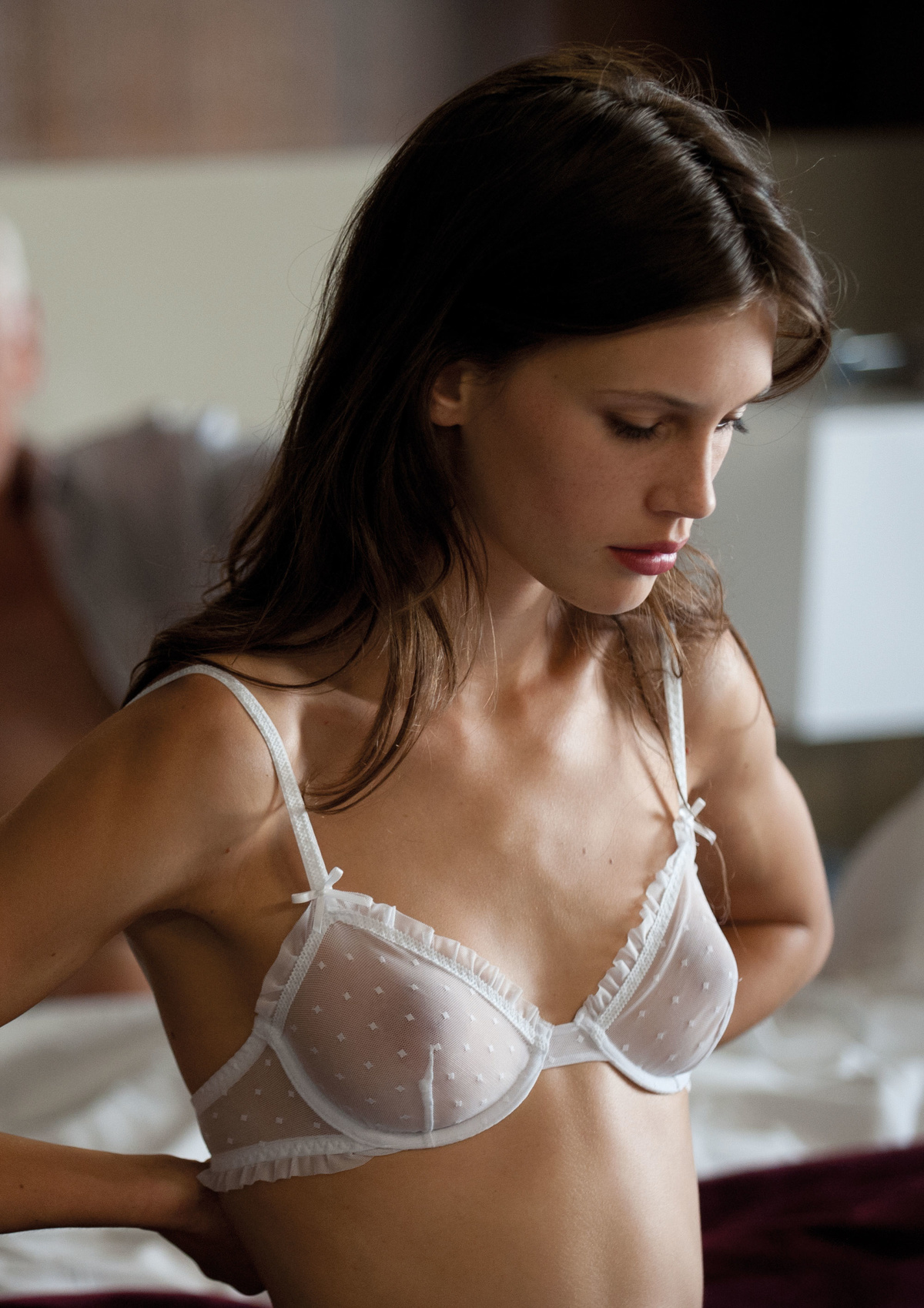The night before we meet Marine Vacth, Jeune et Jolie premieres at the London Film Festival. Directed by François Ozon, Vacth plays Isabelle, a pensive and remote teenager from an affluent Parisian family who lives a double life as a prostitute. Standing on the stage of the Ciné Lumière in Kensington, she introduced the film with less than five whispered words before running from the cinema. Now she’s wearing a white shirt she might have stolen from my grandpa, her hair still wet from the shower. She’s shy, hesitant. Yet she’s stunningly confident, in the most unreadable way, in this film. Vacth was spotted as a 14-year-old wandering around H&M. She’s modelled for Paolo Roversi, Mondino and Juergen Teller, before becoming the face of Yves Saint Laurent’s Parisienne (a gig formerly held by Kate Moss). The star in the reckoning talks to i-D about her highly contentious depiction of nascent female sexuality.
I don’t have a plan to be an actress. I’m going to do what I want to do. Live for today, you know?
When you were first introduced to your character Isabelle through the script, did you feel you understood why she became a prostitute?
Not at first. I got inside her slowly. I took it day by day. I talked a lot with Francois and the other actors. We did many readings of the script. I learnt about her chronologically, as the film unfolds.
Was there a tipping point when you felt like you were inside her head, and able to perform her confidently?
Not really. I worked on it, but I didn’t have one day when I understood her. I don’t really know who she is, even now. I acted from what I supposed.
Francois Ozon has talked about how he sees her as a “mystery,” as “opaque.” Is that the same for you?
She is a mystery to me. I don’t know everything about the character. She doesn’t talk alot. She doesn’t explain anything. She’s had experiences that means she has to do what she does at that moment. She might think about it after, but at the time she does it without thinking too much.
One of the few women to review this film writes: “Her choice of career is not about the sex, it’s about the power.” Do you agree with that?
Yes, but it’s not only about power. It’s partly that. There’s a lot of things. Power is an element. It’s about not knowing who she’s going to encounter each week, and not knowing what’s going to happen. It’s about discovering your sexuality through these relationships with men in general. Because she sees different men each time, it’s about finding out what she likes and what she doesn’t like. And to have a secret life, something she keeps just for her. At that age, I think, your parents still see you as a child, but you’re not a child.
When was the first time you saw the completed film, and what was that experience like?
Seeing it for the first time was the hardest thing about the whole shoot for me. I don’t like to watch it. I’ve watched it twice – once before Cannes, and then once in Cannes. I watched it in Cannes because I couldn’t leave. It’s not very pleasurable to hear my voice, see myself. I prefer not to.
The film very carefully avoids apportioning blame, or suggesting that Isabelle does what she does because of one particular experience. Was that always an objective for you?
It was important for François. He didn’t want to make a sociological movie. He didn’t want to blame, or to say: “She’s like that because of this.” He was interested in filming a young woman getting into this experience, and that’s all he wanted to do.
Did that lack of insight make it more difficult for you to play?
Yes maybe, but I think the movie would lose its power if it has answers.
What research did he ask you to do?
I met the policemen you meet in the movie, and had the same talk with them. But in the end I didn’t think it was necessary for the movie for me to do a lot of research. It’s a concrete film – it’s not Belle de Jour. But she’s also a creation. She’s a character. I couldn’t meet a young girl who had done this secretly, because I wanted to be able to use my own imagination.
If you had met Isabelle when you were at school, and she confided in you that she was a prostitute, what do you think you would advise her?
That if she wants to do that, then she should. If it’s safe for you, then it’s ok.
Do you think Isabelle will continue as a prostitute?
I think she’s alright. She doesn’t need anymore to continue that. I think it’s a just a moment for her. An experiment, and I don’t think she will go on with it.
If you could say something to the Marine that was just starting out on this film, what would you say to her?
It is only going to be difficult, but you should continue whatever.
Do you see yourself as an actress now?
No, not at all. I don’t have a plan for a career. I’m going to promote this movie, which is quite heavy. I’ve read some things, but I don’t have a plan to be an actress. I’m going to do what I want to do. Live for today, you know?
Jeune et Jolie is released in cinemas on the 29th November.
Credits
Text Tom Seymour
